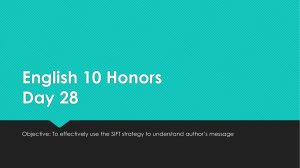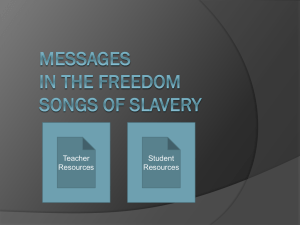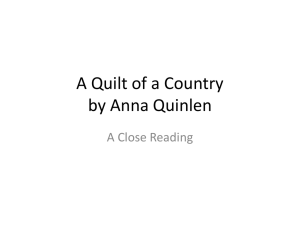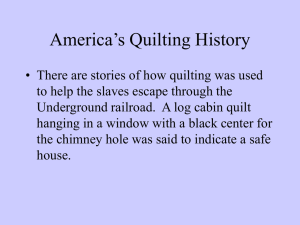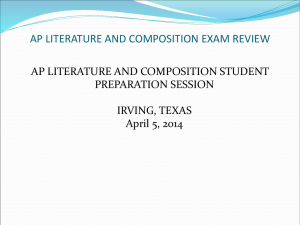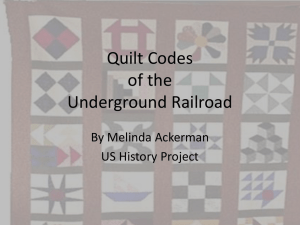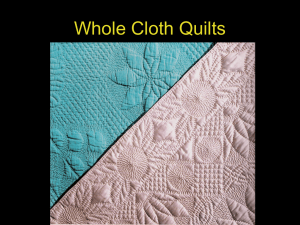Weekly PowerPoint (Lewis)
advertisement
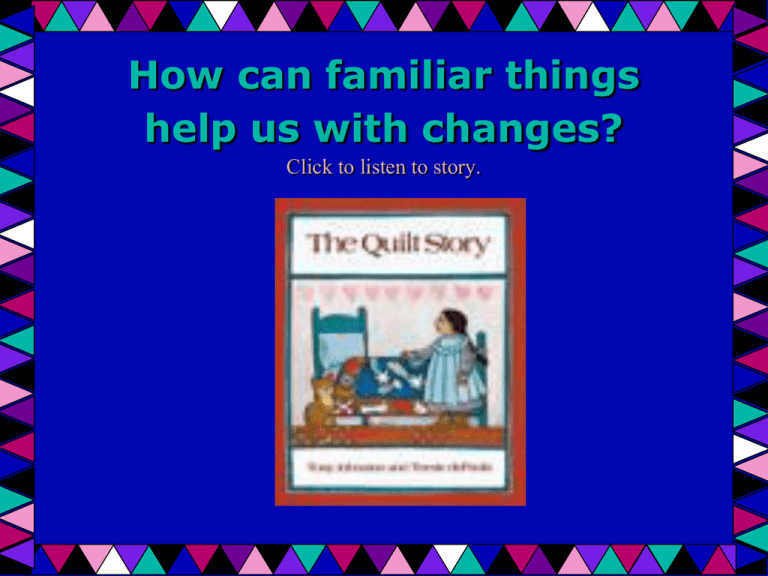
How can familiar things help us with changes? Click to listen to story. Small Group Timer Review Games Vocabulary & Amazing Words: • Arcade Games • Jigword • Matchword • Speedword • Wordsearch • Word Web • Spelling City-Voc. • Spelling City-Amazing Spelling Words: • Speedword • Word Web • Quia Games • Spelling City High Frequency Words • Fill-in-the Blank • Spelling City Quilt Story Amazing Words • preserve • • • • • • • represent valuable tough concentration frown homeland patient Vocabulary Words • blankets • pretended • quilt • stuffing • trunks • unpacked • wrapped • stitched • hatchet • patchwork Quilt Story • • • • • • High Frequency Words beautiful country friend front someone somewhere Quilt Story Word Family Words • start • born • year • cheer • boy • • • • • • • • Spelling ankle title apple cable purple able bugle twinkle Words bundle bubble giggle sparkle tickle mumble scramble Big Question: How can familiar things help us with changes? • Monday • Tuesday • Wednesday • Thursday • Friday Quilt Story Monday Morning Warm-Up Our world is changing all the time. Changing is often hard. How can familiar things help us with changes? Quilt Story Monday Morning Warm-Up Our world is changing all the time. Changing is often hard. How can familiar things help us with changes? Today we will learn about: • • • • • Amazing Words Syllables C + le Compare and Contrast Story Structure Adjectives and Our Senses Quilt Story Amazing Words preserve • pre – serve • When you preserve something, you keep it protected from anything that would cause it to be ruined or spoiled. • You can preserve a photo by putting it in a frame. • You can preserve food by freezing it. represent • rep – re – sent • To represent something means to stand for it or symbolize it. • A person can represent another person or thing. • Flags represent countries. • A mayor represents the people of a city. valuable • val – u - a - ble • If something is worth something or is important to you, it is valuable. • Your friends are valuable to you. • Your mother may have given you a valuable piece of jewelry. Click to listen to a song about some favorite, familiar things. Syllables: C + le • locate • You studied two-syllable words like this already. What do you know about reading two-syllables words? • Today we’ll learn about two-syllable words that end with a consonant and le. • If a word ends with a consonant and le, those three letters make the last syllable in the word. – bun / dle Syllables: C + le • wiggle • You can blend two-syllable words with consonant + le by dividing them into smaller parts. • We usually divide the word so the last consonant + le make up the last syllable of the word. • Read one syllable at a time and then blend them together. – wig / gle Syllables: C + le • • • • • • dim / ple gig / gle ca / ble pud / dle sprin / kle ap / ple • cra / dle • • • • • sim / ple bub / ble spar / kle pur / ple sta / ble Making Words a, e, u b, g, j, l, m, n, p, s, t Syllables: C + le • • • • • • • • wiggle title lumber mumble pilot middle rifle focus • • • • • • • panic ladle bugle tablet noble baby puzzle Syllables: C + le Review: • If a word ends in a consonant plus le, those three letters usually make up the last syllable of the word. • Read one syllable at a time and then blend them together. Quilt Story Word Family Words • start • born • year • cheer • boy • • • • • • • • Spelling ankle title apple cable purple able bugle twinkle Words bundle bubble giggle sparkle tickle mumble scramble Quilt Story Word Family Word – start (online dictionary) Consonant Bart cart dart mart part tart Digraphs chart Blends smart Word Family Word – part hart mart chart cart dart tart Quilt Story Word Family Word – born (online dictionary) Consonant corn horn torn Digraphs thorn Blends scorn sworn Quilt Story Word Family Word – born corn (maize) horn thorn sworn torn Compare & Contrast • Remember “A Walk in the Desert.” • How are our town and a desert alike and how are they different? Compare & Contrast • A selection contains many different ideas. • A writer can organize these ideas in various ways. • Good readers pay attention to the way ideas are organized. Compare & Contrast • One way to organize ideas is to tell how things are alike and different. • A writer can use clue words, such as like and also, to tell how things are alike. • A writer can use clue words, such as but and unlike, to tell how things are different. Story Structure • Story structure is how the writer fits all the parts of the story together. • A writer can organize story ideas by contrasting how things are different or comparing how things are alike. Daily Fix-It • jill rod a purple bike • Jill rode a purple bike. • rick put tap on his ankel • Rick put tape on his ankle. Grammar: Adjectives • An adjective describes a person, place, animal, or thing. • An adjective can tell how something looks, sounds, tastes, feels, or smells. • My family loves hot cornbread. • Hot describes the way the cornbread tastes and feels. Grammar: Adjectives • Grandmother always used yellow cornmeal. Grammar: Adjectives • Grandmother always used yellow cornmeal. • She put in flour, eggs, and cold milk. Grammar: Adjectives • Grandmother always used yellow cornmeal. • She put in flour, eggs, and cold milk. • She added pepper and green chilies. Grammar: Adjectives • Grandmother always used yellow cornmeal. • She put in flour, eggs, and cold milk. • She added pepper and green chilies. • She stirred to make smooth batter. Grammar: Adjectives • Grandmother always used yellow cornmeal. • She put in flour, eggs, and cold milk. • She added pepper and green chilies. • She stirred to make smooth batter. • Now I make delicious cornbread too. Grammar: Adjectives • Grandmother always used yellow cornmeal. • She put in flour, eggs, and cold milk. • She added pepper and green chilies. • She stirred to make smooth batter. • Now I make delicious cornbread too. Wrap Up Our Day! • Words that end with consonant + le • Compare and contrast • Let’s Talk About It • Tomorrow we will read about something that makes a girl feel like she is home—no matter where she is. Quilt Story Monday Journal Topic Write about why friendships are valuable. Quilt Story Tuesday Morning Warm-Up Today we will read about a warm, old quilt. This quilt changes over time. Have you ever owned something for a long time? Quilt Story Tuesday Morning Warm-Up Today we will read about a warm, old quilt. This quilt changes over time. Have you ever owned something for a long time? Today we will learn about: • • • • • • Syllables consonant + le Amazing Words Vocabulary Words Prefixes Word Structure Adjectives and Our Senses Quilt Story Amazing Words tough • tough • If something is difficult to do, it is tough. • If something can take a lot of wear and tear without breaking or being damaged, it is tough. • It might be tough to decide what kind of pet you want. • Jeans are made from a tough material. • Some meat is tough to chew. concentration • con – cen – tra - tion • When you are thinking about one thing very carefully, that is concentration. • If you are trying to solve a math problem and are not paying attention to anything else, you are in deep concentration. • When all you will do for a morning is clean your room, your concentration is on cleaning. frown • frown • When you frown, you wrinkle your forehead and draw your eyebrows together, usually when you are worried, angry, or thinking. • You may frown when you try to think of an answer to a hard question. • A person who is worried about a lost pet may frown. • A smile is the opposite of a frown. Read-Aloud Kimi’s Ocean Syllables: C + le • simple • You can read this word because you know how to read two-syllable words that end with consonant + le. • When you come to a two-syllable word that ends with consonant + le, look for the two syllables. • Read them and then read the word. Syllables: C + le • • • • • • • gentle twinkle jiggle dimple dazzle kettle maple Click to listen to “My Teddy Bear.” Syllables: C + le Find words with consonant + le in “My Teddy Bear.” • • • • • • struggle snuggle trouble pickle little tickle Syllables: C + le scribble, mumble, cradle, ripple, sprinkle, ankle, riddle, paddle, cable, simple, staple, twinkle -kle -dle -ble -ple Syllables: C + le scribble, mumble, cradle, ripple, sprinkle, ankle, riddle, paddle, cable, simple, staple, twinkle -kle -dle -ble scribble -ple Syllables: C + le scribble, mumble, cradle, ripple, sprinkle, ankle, riddle, paddle, cable, simple, staple, twinkle -kle -dle -ble scribble mumble -ple Syllables: C + le scribble, mumble, cradle, ripple, sprinkle, ankle, riddle, paddle, cable, simple, staple, twinkle -kle -dle cradle -ble scribble mumble -ple Syllables: C + le scribble, mumble, cradle, ripple, sprinkle, ankle, riddle, paddle, cable, simple, staple, twinkle -kle -dle cradle -ble scribble mumble -ple ripple Syllables: C + le scribble, mumble, cradle, ripple, sprinkle, ankle, riddle, paddle, cable, simple, staple, twinkle -kle sprinkle -dle cradle -ble scribble mumble -ple ripple Syllables: C + le scribble, mumble, cradle, ripple, sprinkle, ankle, riddle, paddle, cable, simple, staple, twinkle -kle sprinkle ankle -dle cradle -ble scribble mumble -ple ripple Syllables: C + le scribble, mumble, cradle, ripple, sprinkle, ankle, riddle, paddle, cable, simple, staple, twinkle -kle sprinkle ankle -dle cradle riddle -ble scribble mumble -ple ripple Syllables: C + le scribble, mumble, cradle, ripple, sprinkle, ankle, riddle, paddle, cable, simple, staple, twinkle -kle sprinkle ankle -dle cradle riddle paddle -ble scribble mumble -ple ripple Syllables: C + le scribble, mumble, cradle, ripple, sprinkle, ankle, riddle, paddle, cable, simple, staple, twinkle -kle sprinkle ankle -dle cradle riddle paddle -ble scribble mumble cable -ple ripple Syllables: C + le scribble, mumble, cradle, ripple, sprinkle, ankle, riddle, paddle, cable, simple, staple, twinkle -kle sprinkle ankle -dle cradle riddle paddle -ble scribble mumble cable -ple ripple simple Syllables: C + le scribble, mumble, cradle, ripple, sprinkle, ankle, riddle, paddle, cable, simple, staple, twinkle -kle sprinkle ankle -dle cradle riddle paddle -ble scribble mumble cable -ple ripple simple staple Syllables: C + le scribble, mumble, cradle, ripple, sprinkle, ankle, riddle, paddle, cable, simple, staple, twinkle -kle sprinkle ankle twinkle -dle cradle riddle paddle -ble scribble mumble cable -ple ripple simple staple Quilt Story Word Family Words • start • born • year • cheer • boy • • • • • • • • Spelling ankle title apple cable purple able bugle twinkle Words bundle bubble giggle sparkle tickle mumble scramble Word Family Word – year (online dictionary) Consonant dear fear gear hear near rear sear tear year Digraphs shear Blends clear smear spear Quilt Story Word Family Word – year fear year gear sear hear shear tear rear smear clear spear Syllables: C + le • My brother and I giggle when we tickle each other. • My brother and I giggle when we tickle each other. • The stars sparkle and twinkle at night. • The stars sparkle and twinkle at night. Syllables: C + le • The cable is made of purple wires. • The cable is made of purple wires. • What is the title of the song she played on her bugle? • What is the title of the song she played on her bugle? Vocabulary Words • quilt – a bed covering made by stitching together layers of fabric • wrapped – covered by winding or folding • pretended – make-believe • stuffing – soft material used to fill an object • trunks – sturdy boxes in which objects are packed • (next words) quilt quilting frames wrapped stuffing trunks unpacked blankets stitched hatchet patchwork Vocabulary Words • blankets – coverings for beds used to keep sleepers warm • unpacked – removed from a suitcase or other container • stitched – fastened together with stitches • hatchet – small ax with a short handle • patchwork – different pieces of cloth sewn together • (pictures of quilting frames) Vocabulary Words Review • quilt • • • • • • • • • mother pretended father stuffing warm blankets family unpacked ago Vocabulary Strategy: Word Structure • There are strategies to use when you come across words you don’t understand. • You can look them up in a dictionary or glossary. • You can look for context clues in the words and sentences around the unknown word. • Sometimes you can get the meaning from word parts such as the base word and prefix. Daily Fix-It • i ate a puple grape • I ate a purple grape. • did you blow a buble • Did you blow a bubble? Grammar: Adjectives • An adjective describes a person, place, animal, or thing. • An adjective can tell how something looks, sounds, tastes, feels, or smells. • Mother made a large quilt. • Large tells how the quilt looks. Wrap Up Our Day! • Lesson Vocabulary • Story Structure • Let’s Talk About It • Tomorrow we will read about an object that brings joy to all kinds of living things. Quilt Story Tuesday Journal Topic Write about something special you packed for a trip. Quilt Story Wednesday Morning Warm-Up Today we will read more about McKenna and Kimi. McKenna is able to help Kimi feel a little better. How do you make your friends feel better? Quilt Story Wednesday Morning Warm-Up Today we will read more about McKenna and Kimi. McKenna is able to help Kimi feel a little better. How do you make your friends feel better? Today we will learn about: • • • • • Amazing Words Comparative Endings Words with consonant + le Multiple-meaning words Adjectives and Our Senses Quilt Story Amazing Words homeland • home – land • Your homeland is the country in which you were born or where you feel you belong. • Your homeland may be the country you remember living in as a child. • People who were born or raised in France call it their homeland. patient • pa - tient • A patient person can wait for something or put up with some trouble without complaining or getting upset. • You have to be patient when waiting in line. • It takes time to learn how to play a musical instrument, so you must be patient. • You must be patient when teaching younger brothers or sisters how to do new things. Read-Aloud Kimi’s Ocean Comparative Endings: -er and -est • bigger - biggest • You can read these words because you know how to read base words with endings. • The ending –er is used to compare two things, and the ending –est is used to compare three or more things. • Sometimes the final consonant is doubled before -er or –est is added. • If the base word ends in y, change the y to an i before adding –er or -est Comparative Endings: -er and -est Base Word Two Things Three Things Comparative Endings: -er and -est Base Word green Two Things Three Things Comparative Endings: -er and -est Base Word green Two Things greener Three Things Comparative Endings: -er and -est Base Word green Two Things greener Three Things greenest Comparative Endings: -er and -est Base Word green slow Two Things greener Three Things greenest Comparative Endings: -er and -est Base Word green slow Two Things greener slower Three Things greenest Comparative Endings: -er and -est Base Word green slow Two Things greener slower Three Things greenest slowest Comparative Endings: -er and -est Base Word green slow sad Two Things greener slower Three Things greenest slowest Comparative Endings: -er and -est Base Word green slow sad Two Things greener slower sadder Three Things greenest slowest Comparative Endings: -er and -est Base Word green slow sad Two Things greener slower sadder Three Things greenest slowest saddest Comparative Endings: -er and -est Base Word green slow sad happy Two Things greener slower sadder Three Things greenest slowest saddest Comparative Endings: -er and -est Base Word green slow sad happy Two Things greener slower sadder happier Three Things greenest slowest saddest Comparative Endings: -er and -est Base Word green slow sad happy Two Things greener slower sadder happier Three Things greenest slowest saddest happiest Comparative Endings: -er and -est Base Word green slow sad happy brave Two Things greener slower sadder happier Three Things greenest slowest saddest happiest Comparative Endings: -er and -est Base Word green slow sad happy brave Two Things greener slower sadder happier braver Three Things greenest slowest saddest happiest Comparative Endings: -er and -est Base Word green slow sad happy brave Two Things greener slower sadder happier braver Three Things greenest slowest saddest happiest bravest Vocabulary Words blankets, pretended, quilt, stuffing, trunks, unpacked, wrapped • Grandma and I used cloth scraps to make a patchwork ____. Vocabulary Words blankets, pretended, quilt, stuffing, trunks, unpacked, wrapped • Grandma and I used cloth scraps to make a patchwork quilt. • I ____ the present in bright paper and ribbons before I give it to my mom. Vocabulary Words blankets, pretended, quilt, stuffing, trunks, unpacked, wrapped • Grandma and I used cloth scraps to make a patchwork quilt. • I wrapped the present in bright paper and ribbons before I give it to my mom. • My brother_____ he was a dragon. Vocabulary Words blankets, pretended, quilt, stuffing, trunks, unpacked, wrapped • Grandma and I used cloth scraps to make a patchwork quilt. • I wrapped the present in bright paper and ribbons before I give it to my mom. • My brother pretended he was a dragon. • The _____ inside my pillow makes it soft. Vocabulary Words blankets, pretended, quilt, stuffing, trunks, unpacked, wrapped • Grandma and I used cloth scraps to make a patchwork quilt. • I wrapped the present in bright paper and ribbons before I give it to my mom. • My brother pretended he was a dragon. • The stuffing inside my pillow makes it soft. Vocabulary Words blankets, pretended, quilt, stuffing, trunks, unpacked, wrapped • We stored our old clothes and toys in ____ in the attic. Vocabulary Words blankets, pretended, quilt, stuffing, trunks, unpacked, wrapped • We stored our old clothes and toys in trunks in the attic. • The house was cold so mom and I put extra ____ on the beds. Vocabulary Words blankets, pretended, quilt, stuffing, trunks, unpacked, wrapped • We stored our old clothes and toys in trunks in the attic. • The house was cold so mom and I put extra blankets on the beds. • After the trip, I opened my suitcase and ____ my clothes. Vocabulary Words blankets, pretended, quilt, stuffing, trunks, unpacked, wrapped • We stored our old clothes and toys in trunks in the attic. • The house was cold so mom and I put extra blankets on the beds. • After the trip, I opened my suitcase and unpacked my clothes. Quilt Story Word Family Words • start • born • year • cheer • boy • • • • • • • • Spelling ankle title apple cable purple able bugle twinkle Words bundle bubble giggle sparkle tickle mumble scramble Quilt Story Word Family Word – cheer (online dictionary) Consonant beer deer jeer leer peer veer Digraphs Blends sneer steer Quilt Story Word Family Word – cheer deer veer jeer sneer leer steer peer steer Multiple-Meaning Words • Words that have more than one meaning are multiple-meaning words. • The trunk of this tree is bumpy and brown. • We put bags in the trunk of our car. • Water squirted from the elephant’s trunk. • Dan put on his trunks and went for a swim. Multiple-Meaning Words • change • Liz put her change in her piggy bank. • Please change your wet clothes. • Babies grow and change over time. Daily Fix-It • ann made an aple pie. • Ann made an apple pie. • do you like pie. • Do you like pie? Grammar: Adjectives • An adjective describes a person, place, animal, or thing. • An adjective can tell how something looks, sounds, tastes, feels, or smells. Grammar: Adjectives Think of words that tells how these fruits taste, look, feel, smell, and sounds. Apple Grape Wrap Up Our Day! • Compare and Contrast • Read with Accuracy and Appropriate Pace • Let’s Talk About It • Tomorrow we will read about a quilt that was made for a special birthday celebration. Quilt Story Wednesday Journal Topic Write a paragraph explaining how a tree's trunk changes over time. Quilt Story Thursday Morning Warm-Up Today we will read about another quilt. It was stitched by the people of Brewster. The pictures on the quilt represent important things about the town. What would a quilt of your town include? Quilt Story Thursday Morning Warm-Up Today we will read about another quilt. It was stitched by the people of Brewster. The pictures on the quilt represent important things about the town. What would a quilt of your town include? Today we will learn about: • • • • Review Amazing Words Review Vocabulary Words Syllables: consonant + le Adjectives and Our Senses Quilt Story Amazing Words • preserve • • • • • • • represent valuable tough concentration frown homeland patient Read-Aloud The Good Gift Vocabulary Words • blankets • pretended • quilt • stuffing • trunks • unpacked • wrapped • stitched • hatchet • patchwork Sentence Reading • Someone made that apple pie on the table. • The bridle might be somewhere in the stable. • Did you see my friend cry when he took a tumble? Sentence Reading • We will fly kites high in the sky when we go to the country. • My beautiful purple bike is so nice to ride. • I did not like the sight of a bee right there in the front yard. Quilt Story Word Family Words • start • born • year • cheer • boy • • • • • • • • Spelling ankle title apple cable purple able bugle twinkle Words bundle bubble giggle sparkle tickle mumble scramble Quilt Story Word Family Word – boy (online dictionary) Consonant coy joy Roy soy toy Digraphs Blends ploy Troy Quilt Story Word Family Word – boy joy coy toy soy Making Memories: Changing with the Times Pages 34 - 39 Daily Fix-It • tom has a bunndle of books? • Tom has a bundle of books. • i am able to write my nam • I am able to write my name. Adjectives Choose adjectives that describe each of the senses. Look Feel Taste Sound Smell Wrap Up Our Day! • Text to Self • Let’s Talk About It • We have read selections that explain how familiar things can help us deal with changes. Tomorrow we will learn more about how things change. Quilt Story Thursday Journal Topic List different landmarks in your city. Quilt Story Friday Morning Warm-Up This week we read about ways to make tough changes easier. One way is to preserve familiar things. Why are familiar things valuable? Quilt Story Friday Morning Warm-Up This week we read about ways to make tough changes easier. One way is to preserve familiar things. Why are familiar things valuable? Today we will learn about: • • • • Syllables: Consonant + le Vocabulary Words Adjectives and Our Senses Reference Sources Quilt Story Amazing Words • preserve • • • • • • • represent valuable tough concentration frown homeland patient Read-Aloud The Good Gift Vocabulary Words • blankets • pretended • quilt • stuffing • trunks • unpacked • wrapped • stitched • hatchet • patchwork Syllables: Consonant + le • The baby slept in a simple little cradle. • The baby slept in a simple little cradle. • I was able to pick the apple from the tree. • I was able to pick the apple from the tree. Syllables: Consonant + le • Mom will sprinkle pepper on top of my noodle dish. • Mom will sprinkle pepper on top of my noodle dish. • I like to snuggle and giggle with Mom and Dad. • I like to snuggle and giggle with Mom and Dad. Vocabulary Words wrapped, unpacked, stuffing, blankets, quilt, pretended, trunks • This is something you can sew from squares of fabric. • quilt • You fill a quilt with this to make it soft. • stuffing • This means the same as made believe. • pretended • This goes with chests and crates. • trunks Vocabulary Words wrapped, unpacked, stuffing, blankets, quilt, pretended, trunks • This is what you did when you returned home from a trip. • unpacked • This is something that has been done to a gift. • wrapped • These help keep you warm at night. • blankets Quilt Story Word Family Words • start • born • year • cheer • boy • • • • • • • • Spelling ankle title apple cable purple able bugle twinkle Words bundle bubble giggle sparkle tickle mumble scramble Quilt Story High Frequency Words • • • • • • beautiful country friend front someone somewhere Daily Fix-It • can jim play a buggle • Can Jim play a bugle? • the show made Me giggle • The show made me giggle. Reference Sources • If you don’t know the meaning, spelling, or pronunciation of a word, look it up in a dictionary. • When you are looking for information about a topic, I sometimes use an encyclopedia. • When you want to use more interesting words in your writing, look in a thesaurus for different words that have similar meaning. Reference Sources • If you want to see maps, use an atlas. • You also use the computer as a reference source. You can use several reference sources on CDROM, such as encyclopedia, atlas, and thesaurus. • You can use the computer to search the Internet for information about a topic. Wrap Up Your Week! Let’s Talk About Our Changing World Quilt Story Friday Journal Topic Write about a class that makes a special quilt. We are now ready to take our story tests. • Story test – Classroom webpage, – Student page, – Taking Tests • AR – Other Reading Quizzes – Quiz # 904633

